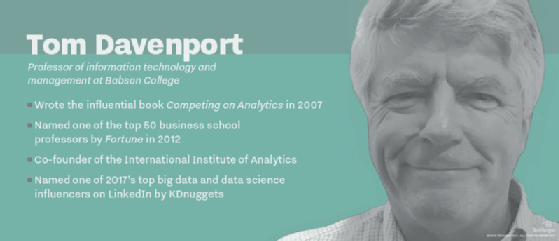AI winter is coming? Not this time, Tom Davenport says
A new AI winter, or downturn, is unlikely, even if the current slew of inflated expectations surrounding AI predicts inevitable disappointment, analytics expert Tom Davenport says.
In part two of our interview with Babson professor and analytics expert Tom Davenport -- author of a new book about AI -- we explored some of the best use cases of AI and how the ever-inflating promotion of the technology creates an impression that another AI winter is coming in the near future.
In past stages of AI, excessive marketing has led to unfulfilled promises and disappointment. This, in turn, has helped fuel the AI winters of the past, in which development of the technology all but stopped due to disillusionment. Davenport doesn't think another AI winter is coming now, as there has been too much real progress in recent years. But he did say the overpromotion affects how AI is being adopted and used.
Are there any specific AI implementations or broad types of applications you've seen that you think have been really significant?
Davenport: I think KPMG has a fairly substantial investment in Watson, but I think it's only really nipping away at the margins of the audit process so far.
In sales, I think you could question whether it's anything new, but these models -- scoring models for leads and doing propensity modeling for customer prospects -- I think it's quite useful. Salesforce added Einstein. It wasn't rocket science, to begin with, to do predictive lead scoring. It's basically predictive analytics, as you were saying, but nonetheless, it's quite useful and can be quite valuable and not that hard to implement, particularly if it's something that you do through your CRM [customer relationship management] system.
I just did a survey with Oracle on HR analytics, which people call AI, and it's being used to do attrition modeling, identifying the people who are most likely to leave. Again, it's predictive analytics, but it is also machine learning.
Interestingly, when I did these surveys, the No. 1 objective people have for AI is enhancing existing products and services. So, from a functional perspective, I don't know what you call that, maybe product development or product refinement, but it's showing up in things like semiautomated wealth management services. It's putting more AI into search for the Googles of the world. It's adding AI functionality to the products and services you already have. That's the No. 1 objective.
That seems like kind of a strong theme for you in this book: AI for automation rather than creating some new product or line of business.
Davenport: I don't call it automation because, for me, automation dips into the whole issue of jobs and everything else, and I'm more of an augmentation person than an automation person. But I do think that creating entirely new products was a high-level objective in 2017 but will be substantially lower in 2018. So, I don't know if that reflects the difficulty of that.
You know, I have a Tesla. I think it's somewhat fun to use Autopilot, but believe me, if you haven't tried it, it is not fully autonomous by any means. So, it's a slight improvement over what's in my wife's Subaru, which will sort of keep track of when you're leaving the lane. In the Tesla, you can let go of the steering wheel for 15 seconds, but I consider that only marginal improvement.

Do you think we've maybe gone a little too far in inflating the potential of this technology -- leading some to predict that another AI winter is coming -- or is it justified in some ways?
Davenport: This industry overall has hyped a lot of things in the past. We hyped e-commerce, and we hyped analytics, and we hyped AI in a similar kind of fashion. I do think it goes too far. I believe it's a very powerful technology, and I think it will be revolutionary in the long run, but it's pretty evolutionary in the short run. So, it's probably got people hyped up beyond what it can deliver on in many organizations.
But I don't think it's very likely that we'll go back to another AI winter just because we overhyped it. I think people will be somewhat disappointed to see how slowly this stuff changes life as we know it, but over time, I think it will be quite astounding.
I contrasted the MD Anderson case -- which was full of media hype about, 'Oh, we're basically curing cancer already' -- and the Memorial Sloan Kettering approach. They were the first partner of IBM Watson, and they've been much calmer about it. I interviewed the guy who led the project a few years ago, and he said, 'Yeah, we're going to get there; it's going to take a lot longer than anybody thought, but we will use this to help us treat cancer.' And I think being quiet and not assuming it's going to revolutionize everything overnight is the way to go.
I do think some vendors have been much worse than others. IBM, you have to either view them as the best at marketing or the worst at hype, one or the other. And I think it's come back to bite them in the rear. I think there's been a lot of disillusionment with that particular technology, that particular vendor, more than anybody else. But overall, I think the technology will do fine.







